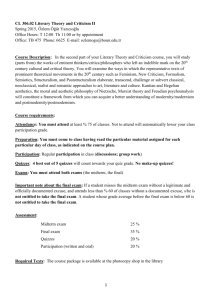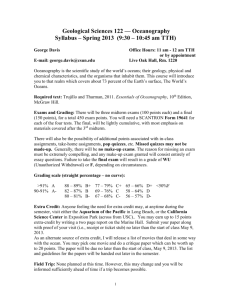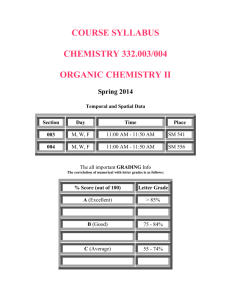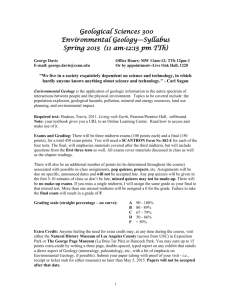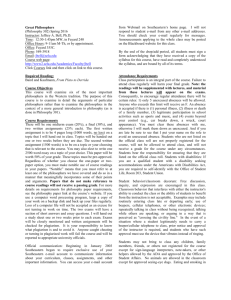BIO 169 Ron Coleman BIO 169 Ron Coleman Animal Behavior (Bio
advertisement
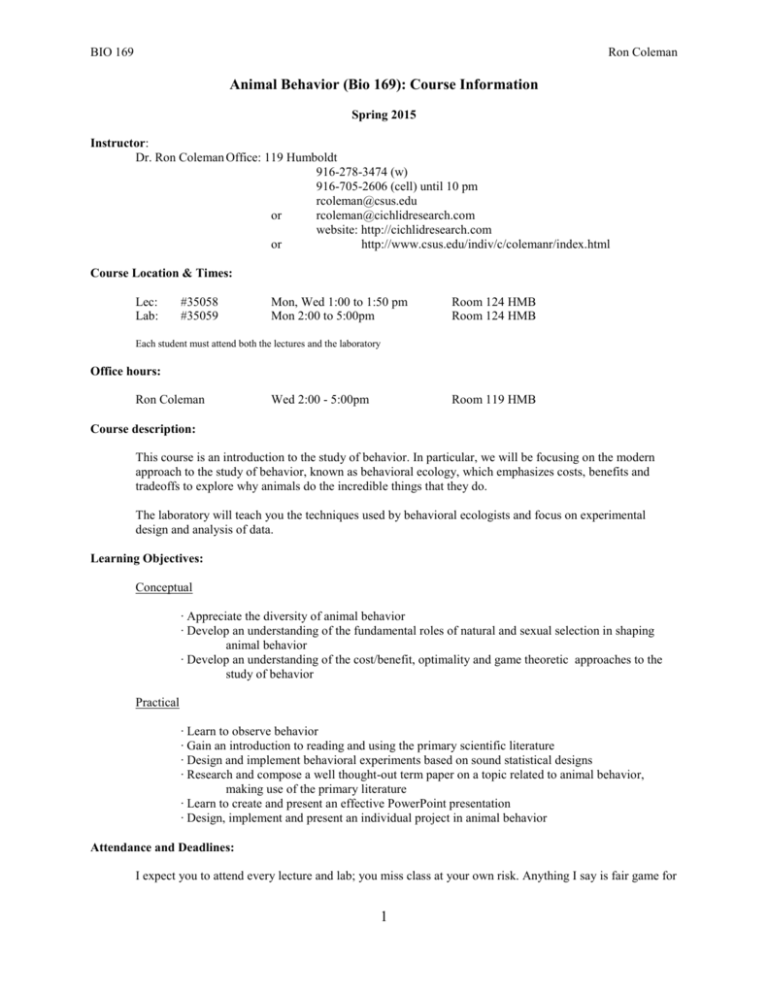
BIO 169 Ron Coleman Animal Behavior (Bio 169): Course Information Spring 2015 Instructor: Dr. Ron Coleman Office: 119 Humboldt 916-278-3474 (w) 916-705-2606 (cell) until 10 pm rcoleman@csus.edu or rcoleman@cichlidresearch.com website: http://cichlidresearch.com or http://www.csus.edu/indiv/c/colemanr/index.html Course Location & Times: Lec: Lab: #35058 #35059 Mon, Wed 1:00 to 1:50 pm Mon 2:00 to 5:00pm Room 124 HMB Room 124 HMB Each student must attend both the lectures and the laboratory Office hours: Ron Coleman Wed 2:00 - 5:00pm Room 119 HMB Course description: This course is an introduction to the study of behavior. In particular, we will be focusing on the modern approach to the study of behavior, known as behavioral ecology, which emphasizes costs, benefits and tradeoffs to explore why animals do the incredible things that they do. The laboratory will teach you the techniques used by behavioral ecologists and focus on experimental design and analysis of data. Learning Objectives: Conceptual ∙ Appreciate the diversity of animal behavior ∙ Develop an understanding of the fundamental roles of natural and sexual selection in shaping animal behavior ∙ Develop an understanding of the cost/benefit, optimality and game theoretic approaches to the study of behavior Practical ∙ Learn to observe behavior ∙ Gain an introduction to reading and using the primary scientific literature ∙ Design and implement behavioral experiments based on sound statistical designs ∙ Research and compose a well thought-out term paper on a topic related to animal behavior, making use of the primary literature ∙ Learn to create and present an effective PowerPoint presentation ∙ Design, implement and present an individual project in animal behavior Attendance and Deadlines: I expect you to attend every lecture and lab; you miss class at your own risk. Anything I say is fair game for 1 BIO 169 Ron Coleman exams, whether it is in the text or not. Some things I say will definitely not be in the text, and some may contradict the text. In the latter case, what I say is taken to be the correct answer. If there is a difference between what I say and what is in the text or what you have learned elsewhere, please ask about it in lecture or after class and we will discuss the differences. My goal as a lecturer is to guide and assist you in learning about this material. I can't do that if you aren't in class or if you don't tell me what you don't understand. If you miss a class, it is your responsibility to get the notes from another student, not from me. I DO NOT hand out lecture notes, nor do I post them to the web. Deadlines are strictly adhered to. It is not fair to students that complete work on time for other students to have extra time to do the same work. Plan ahead and schedule your time. Most importantly, don't leave things to the last minute; you don't need that kind of stress! Email policy: This course does not use SacCT. However, we do make regular use of email. On occasion, I may send important messages to your Saclink account. As a Sac State student, you are responsible for regularly checking your Saclink email account (i.e., daily). Failing to do an assignment because you did not check your Saclink email account is your problem. Furthermore, when corresponding with me about this course, you MUST use your Saclink email account, not a gmail, yahoo or any other email account. This is an official University policy. Field Trip: There is a mandatory field trip (Sunday, Feb 8) to Ano Nuevo to see the elephant seals. If you cannot go this Sunday, you are required to go another day and to show me the receipt. Because Ano Nuevo is about 3 hours away, this is an all-day trip. Textbook: Krebs, J.R. & N.B. Davies. 2012. An Introduction to Behavioural Ecology. Fourth Edition. Blackwell, London. REQUIRED. Dawkins, R. 1976. The Selfish Gene. Second Edition. Oxford. ISBN 0-19-286092-5 REQUIRED. Exams: There will be two midterms and a final for the lecture portion of the course. There will be a midterm and a final in the lab, both held during lab time. Midterms are held during the lecture period and will be a mixture of fill-in the blank, short-answer and essay questions. I do not believe in multiple choice questions and do not use them. Exams will be comprehensive, i.e., anything in the whole course up to that point in time is fair game. My previous students comment on two aspects of my exams: I am a hard grader and I am a fair grader. You can expect long exams that test your knowledge, but they will be exams without tricks. My goal is to have you tell me what you know and understand. You will have to work very quickly. Grading: This course is worth 3 units. The number of points/questions on a particular exam is irrelevant to the exam's worth -- it is merely a tool for grading. What matters are the following percentages. Your lecture grade will be calculated according to the following scheme: 2 BIO 169 Ron Coleman Midterm I Midterm II Final Exam Term Paper 20 25 35 20 ---100% Your lab grade will be calculated according to the following scheme: Midterm Final Project Other Labs 20 20 30 30 ---100% NOTE: You must retain in some orderly fashion all assignments and graded materials until after the end of the semester (i.e., June). You may be asked to produce these at the end of the semester. Failure to produce an assignment will result in a grade of 0 for that assignment. Your course grade will be a combination of your lecture and lab grades as follows: Lecture 2/3 Lab 1/3 Your letter grade will be calculated according to the following table: A = 93 to 100% A- = 90 to 92.9% B+ = 87 to 89.9% B = 84 to 86.9% B- = 80 to 83.9% C+ = 77 to 79.9% C = 73 to 76.9% C- = 70 to 72.9% D+ = 67 to 69.9% D = 60 to 66.9% F = 0 to 59.9% I generally do not adjust or curve or scale grades; If you want an "A", work for it and make it happen! I do not hesitate to correct any errors I make in grading (e.g., incorrect addition or if I missed grading an answer), but keep in mind that I am looking for clear, succinct answers, not answers that sort-of-show-youpossibly-might-know-what-you-mean. If you feel that your answer deserves a better grade, please return it to me promptly. I do not use "extra credit" assigments. Health and Safety: Read and sign the separate Safety sheets. Honor Code: Please don't cheat. Besides the fact that we will be forced to take strong measures if we catch you -including recommending your dismissal from the class and from the university -- I will be profoundly disappointed in you. Don't even think about doing any of the following: a. giving or receiving information from another student during an examination 3 BIO 169 Ron Coleman b. c. d. e. f. using unauthorized sources for answers during an exam such as writing answers on hats, clothing or limbs illegally obtaining the questions before an exam altering the answers on an already-graded exam any and all forms of plagiarism destruction and/or confiscation of school and/or personal property Feedback: I appreciate your feedback on this course. It is most useful to tell me things while the course is in progress, rather than waiting until the end of the course. If there is something that needs changing, LET ME KNOW and I will see what I can do about it. This course is a collaboration between you and me. I really enjoy teaching this class and I want you to have a great time as well. 4 BIO 169 Ron Coleman Week Date Lecture Lab Ch . 1 Jan 26 Jan 28 Introduction to Class Intro to Animal Behavior Survey of skills; Examine/present journal articles from Behavioral Ecology 1 2 Feb 2 Feb 4 Natural Selection Natural Selection, Group Selection Experimental Design (regression, t-test, Chisquare); “Jewel of the Rift”video and exercise 2 Feb 8 FIELD TRIP TO Ano Nuevo for elephant seals 3 Feb 9 Feb 11 Directions of Selection Economic Decision Making Discuss field trip to Ano Nuevo for Elephant Seals; Elephant Seal video; Discuss “Decision Rules..” paper 3 4 Feb 16 Feb 18 Foraging Foraging Marginal Value Theorem experiment 5 Feb 23 Feb 25 Feb 23: Lecture Midterm 1 Prey choice Feb 25: Term paper proposal due Microsoft Excel for Behavior Biologists Microsoft Excel for Constructing Graphs 6 Mar 2 Mar 4 Risk; Optimality Predator vs Prey Using Powerpoint; Discuss individual projects 4 7 Mar 9 Mar 11 Evolutionary Arms Races Competing for Resources Sample Powerpoint Presentations; Excel Data Analysis tools (t-test, regression) 5 8 Mar 16 Mar 18 Optimal Group Size Fighting & Assessment; Term paper Part I due Lab Midterm 6 9 Mar 23 Mar 25 Spring Break – no classes 10 Mar 30 Apr 1 Fighting & Assessment 11 Apr 6 Apr 8 Apr 6: Lecture Midterm 2 Game Theory Game Theory 12 Apr 13 Apr 15 Field Trip Apr 13: Term paper due; Sexual Selection Field trip to Sacramento Zoo (during class) 13 Apr 20 Apr 22 Sexual Selection Sexual Selection Project presentations 14 Apr 27 Apr 29 Parental Care Project presentations 9 15 May 4 May 6 Alternative Strategies Altruism & Cooperation Project presentations 10, 11 TBA 5 8 BIO 169 Ron Coleman 16 May 11 May 13 TBA 17 May 18 Final Exam Mon May 18 12:45-2:45 Lab Final and Poster Session 6



